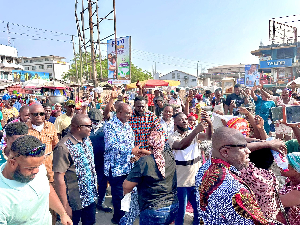 Alan Kyerematen with his team when they visit the Kantamanto Market
Alan Kyerematen with his team when they visit the Kantamanto Market
After witnessing the devastation caused by the recent fire at the Kantamanto Market, Alan Kyerematen, leader of the Movement for Change and a prominent advocate for economic transformation, has called on the government to establish a $2billion Market Infrastructure Development Fund.
Speaking to journalists, he described the fund as a sustainable solution to financing the development of modern market infrastructure across the country, which he sees as critical to revitalising commerce and distributive trade.
This recommendation aligns with advice Alan had previously offered to President John Dramani Mahama during a courtesy call in his office as the President-Elect.
He suggested that the proposed fund should be seeded with an initial capitalization of GH¢500 million and supplemented with contributions from the corporate private sector.
To encourage their participation, he proposed that donations to the fund should be tax-deductible, making it financially advantageous for businesses to support the initiative.
“The corporate private sector either directly or indirectly benefits from market operations and must play an active role in building resilient infrastructure to sustain it,” he stated.
Kyerematen also highlighted the broader economic benefits of modernised markets, particularly their role in controlling inflation.
According to him, vibrant retail market activities stabilize prices by improving the distribution of goods, which is essential to ensuring the affordability of essential products.
He emphasised that market modernisation is not just a commercial necessity, but an economic imperative for improving livelihoods and national development.
He further proposed that Metropolitan, Municipal, and District Assemblies (MMDAs) allocate a fixed percentage of their market toll revenues to the fund.
This would ensure consistent financial inflows to support the establishment of modern market facilities in all 260 districts.
Such infrastructure, he noted, would create safer and more efficient trading environments, protecting both lives and property while enhancing economic productivity.
Reflecting on the potential impact, Alan Kyerematen described the fund as a mechanism for stimulating small businesses and creating wealth.
Modern markets, he noted, would not only offer improved facilities for traders, but also expand economic opportunities for small-scale entrepreneurs and reduce unemployment.
In his view, these outcomes would strengthen domestic trade and form the foundation for broader economic transformation.
Standing at the heart of the fire-ravaged market, Alan reminded stakeholders of the urgent need to adopt proactive measures to prevent such disasters. He stressed that his proposed solution would safeguard against future tragedies and position Ghana’s markets as hubs of innovation and growth.
“We owe it to the traders and the entire economy to build market infrastructure that is not only modern but also safe and sustainable,” he said.
Kyerematen’s proposal resonates with his Great Transformational Plan (GTP), which prioritises economic stability and infrastructure development.
His call for a Market Infrastructure Development Fund reaffirms his passion and vision for an inclusive economy that leverages the strength of robust domestic trade network to drive national progress.
Watch the latest edition of BizTech below:
Click here to follow the GhanaWeb Business WhatsApp channel
AE